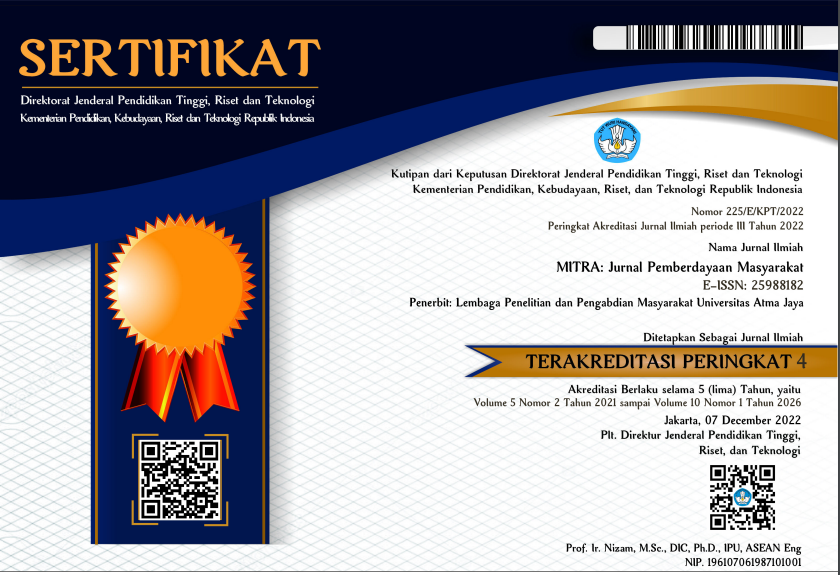Community Empowerment through The Hygiene and Competitive Production of Balobo Salted Fish
DOI:
https://doi.org/10.25170/mitra.v3i2.895Kata Kunci:
competitive, hygiene, balobo fishAbstrak
Maluku Province is the national source of the fishery and the overload production urges its society to use the fish salting method since the market is unable to absorb all the production. One of the results of this salting method is Balobo fish from Aru Island. Although tasteful and delicious, the product has no Halal Certification and Food Production Certificate yet and the household industry could only make low sales because of traditional production methods that do not utilize technology, which results in low quality and quantity. Because of this condition, the purpose of community empowerment is to increase the hygiene and competitive production of balobo salted fish. The purpose of these activities is to increase the economy of the society who acts as the producer of balobo salted fish. The methods used are design thinking, socialization, production equipment training, water reduction in salted fish to make it long-lasting, and the checking of the nutrient content. The objectives of the activities include mindset alteration of society from conventional production to technology, hygiene production process, halal certification from Majelis Ulama Indonesia, availability of the nutrient content information, and the enhancement of product endurance by reducing the water content in the product. We conclude that changing the mindset and technology may increase the society's standard of living. We propose that the society be given monetary aid for the capital and the purchase of modern machinery to accelerate the production and sales process
Referensi
Biro Pusat Statistik Maluku. (2017). Laporan badan pusat statistik Maluku. Ambon: BPS.
Direktorat Inovasi dan Inkubator Bisnis. (2016). Design thinking. https://diib.ui.ac.id › wp-content › uploads › 2016/08 › Design-Thinking2. Diakses 7 Agustus 2019.
https://maluku.bps.go.id/publication/2019/08/16/1491fd5b45fa85a8a94b79b7/ provinsi-maluku-dalam-angka-2019.html. Diakses 7 Agustus 2019.
Humas DJPT. (2018). Pelabuhan Perikanan Dobo Kepulauan Aru dijadikan sentra lumbung ikan nasional.
https://news.kkp.go.id/index.php/pelabuhan-perikanan-dobo-kepulauan-aru-dijadikan-sentra-lumbung-ikan-nasional-2. Diakses 5 Agustus 2019.
Kepulauan Aru. http://www.malukuprov.go.id/index.php/2016-10-06-01-23-21/2016-10-12-00-37-52. Diakses 5 Agustus 2019.
Kusnadi. (2007). Stategi Hidup Masyarakat Nelayan. Yogyakarta: LKiS.
Prasasty, V. D., Gunadi, M., & Vivin. (2018). Identifikasi pengetahuan higienitas dan sanitasi. Mitra: Jurnal Pemberdayaan Masyarakat, 2(2), 137--146.
Ubwarin, E. (2018). Penegakan hukum yang dilakukan oleh polair Polda Maluku. Jurnal Muara Ilmu Sosial, Humaniora, dan Seni, 2(1), 44--51.
Unduhan
Diterbitkan
Cara Mengutip
Terbitan
Bagian
Lisensi
This license allows reusers to distribute, remix, adapt, and build upon the material in any medium or format for noncommercial purposes only, and only so long as attribution is given to the creator. If you remix, adapt, or build upon the material, you must license the modified material under identical terms.







_.jpeg)




.png)
2.png)
.png)
.png)



